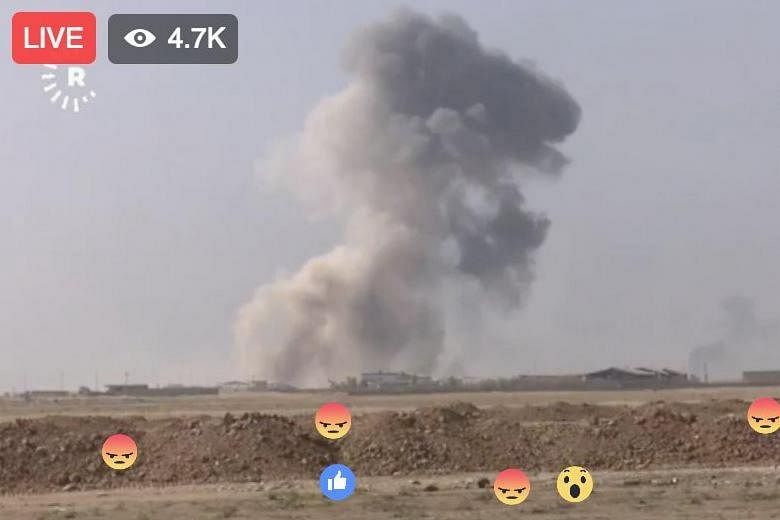(BLOOMBERG) - The picture looked like many others beamed across the world from war zones: plumes of smoke floating above a faraway town, hinting at destruction that remained out of sight.
Except this footage had emojis zipping across the bottom of the screen. Surprised. Angry. And thumbs up.
A number of TV stations, including Rudaw, a Kurdish news agency, and Iraqiya TV, a public broadcaster in Iraq, have been live streaming the long-planned advance of Iraqi troops and Kurdish fighters into Mosul, the northern Iraqi city that is Islamic State in Iraq and Syria's (ISIS) last major stronghold in the country.
Mosul has been under ISIS control since 2014. Iraqi forces, backed by Kurdish fighters and US-led coalition airstrikes, are now fighting to retake the territory. The United Nations has warned that as many as 700,000 of Mosul's 1.2 million residents could flee the fighting.
Al Jazeera, the Doha-based state-funded broadcaster, and the UK's Channel 4 published the feed from Rudaw on their Facebook pages. Al Jazeera's live stream had more than 875,000 views.
While live streams of the aftermath of attacks are not uncommon, this appears to be one of the first times news organisations are using Facebook Live to broadcast a military operation over an extended period.
It's easy to understand why Kurdish and Iraqi TV stations would want to broadcast a large operation of military force against ISIS-and why generals would allow them to do so, said Elizabeth Quintana, a senior research fellow at the Royal United Services Institute, a London-based defence and security research organization.
"IS have been extremely good at web-based propaganda, recruitment online and getting the message online using high quality videos of their own operations," she said, referring to the group by its other name IS. "So it doesn't surprise me that Kurdish fighters are taking the fight to them online and on the ground."
She added: "It's certainly to undermine the message that IS has been putting out that they are undefeatable."
Broadcasters set up cameras as early as last week in the safest location close to Mosul before zooming in as far as they could, Hemin Lihony, Rudaw's head of digital portal, said in an email. The cameras are now moved closer each day as forces make further advances, he said.
Rudaw's audience on Facebook has increased more than 200 per cent this week, Lihony said.
In some ways, this is a natural evolution of how the media operates in a real-time information age and adds to the ongoing debate of what is acceptable to broadcast.
During the Gulf War in the early '90s, CNN broke new ground by broadcasting live audio of bombing raids.
The network brought live coverage of the Gulf War to your living room. Twitter has facilitated the real-time spread of images and information.
Witnesses used Facebook to stream live footage of a shooting in Dallas that killed five police officers.
Now, you can watch the war live on your phone, during your commute.
Some commenters illustrated the bizarre feeling of being able to observe the action live. "Watching from my home in Birmingham UK, eating breakfast that's really amazing," said one man who identified himself on Facebook as Rebwar Swra. He said he wished them all "a safe return home", adding "May god bless them all".

